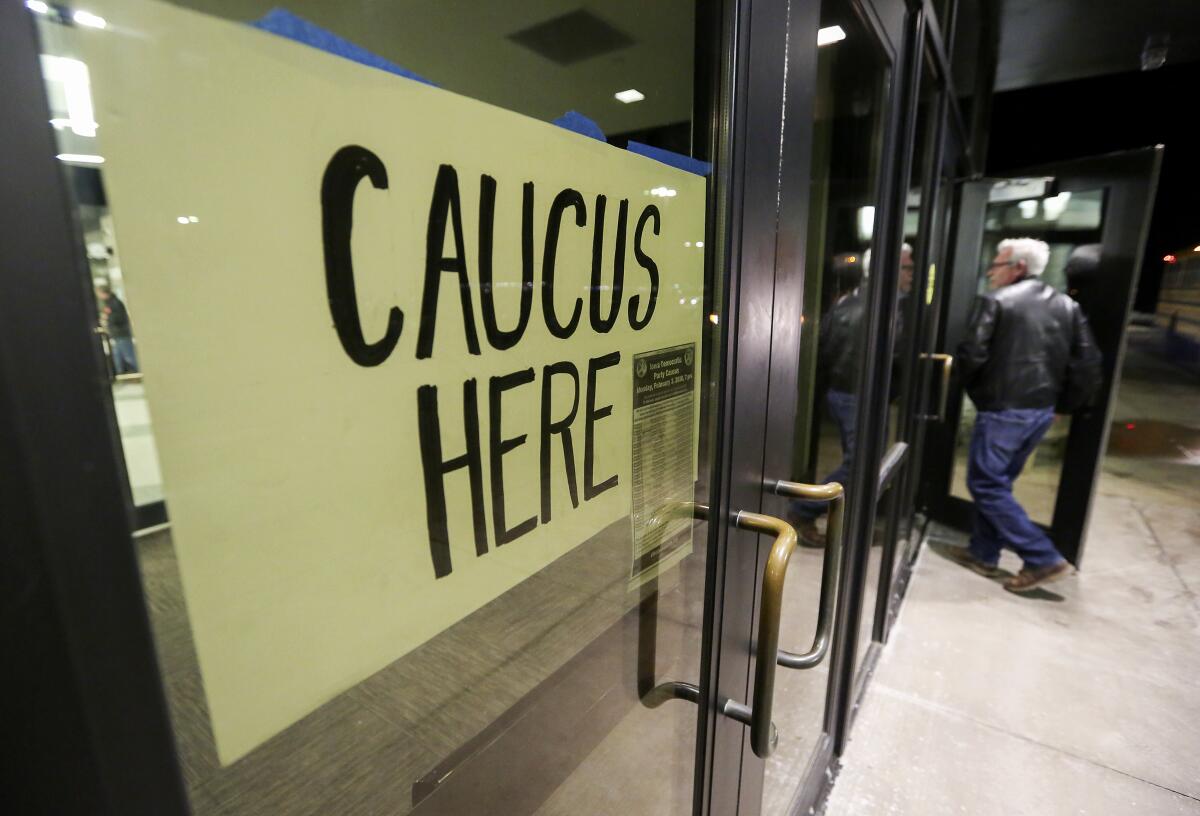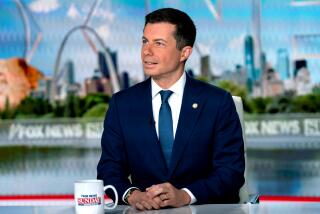Notes from the Iowa caucuses, where the pundits are seething and every candidate is a winner

- Share via
DES MOINES — The debacle in Des Moines.
The calamity in Council Bluffs.
The waterloo in…Waterloo.
Call it what you will, the failure of the Iowa Democratic Party to receive and report results of its ultra-hyped first-in-the-nation presidential-nominating contest in a timely manner was a huge disappointment to Democrats, a boon for Republicans and a reminder that there doesn’t need to be voter fraud for there to be post-caucus chaos.
All it takes is a new way of counting votes, an untested app, and misplaced faith in technology. Remember the botched rollout of the Obamacare website in 2013?
That said, everybody was a winner in Iowa on Monday night!
Minnesota Sen. Amy Klobuchar gave the first televised “victory” speech, followed by former Vice President Joe Biden, Vermont Sen. Bernie Sanders, Massachusetts Sen. Elizabeth Warren and former South Bend, Ind., Mayor Pete Buttigieg, who just kept talking and talking. “Iowa,” he began, “you have shocked the nation.”
Boy and how, though probably not in the way he meant.
It was, in any case, delightful to hear the first serious gay contender for the White House refer to “the love of my life”— his husband — who stood out of camera range. How I wish Chasten had sidled next to Pete, just as Jill Biden did with Joe, and Jane Sanders did with Bernie.
The premature victory speeches were a bit jarring but a blessed relief for CNN talking heads, who, in the absence of results, stared at a blank Iowa map and just kept getting angrier and angrier at the Iowa Democratic Party.
::
On Monday evening I attended a large, well-run caucus in Ankeny, one of the fastest growing suburbs in the country, according to its Democratic state Rep. Heather Matson, who ousted a Republican incumbent in 2018. Ankeny is north of Des Moines, with new, upscale subdivisions filled with the kinds of suburban women who could help flip this purple state, which voted overwhelmingly for Trump in 2016, back to blue.
In the well-lit gym of Prairie Trail Elementary School, there was no hint of the confusion to come. Some 337 caucusgoers, many with children in tow, sat quietly in orderly rows of folding chairs, listening to instructions. After some quick calculations, it was determined that a candidate needed at least 51 votes ( 15% of the total ) to be considered viable, or eligible for a share of delegates.
It took about an hour to dispense with the basics, after which folks were instructed to pick up their folding chairs and move into candidate preference groups. For a moment, the room looked like a giant game of musical chairs.
It soon became obvious that Klobuchar, Tom Steyer, Andrew Yang, Tulsi Gabbard, Michael Bennet and Michael Bloomberg had not attained viability. Biden came closer, but ultimately only 36 people sat under his sign; they dispersed to viable candidates, or went home.
After half an hour or so, the room had shaken out. The final result: Buttigieg got 149 votes and four delegates; Warren got 100 votes and Sanders got 83, and each got three delegates.
Caucus chairwoman Andrea Dencklau told me Tuesday morning that she didn’t even have the reporting app that caused so much strife. But when she tried to call her results in, she was kept on hold for more than 30 minutes before hanging up. Finally, she took a photo of her results and emailed it to the Polk County Democratic director, then drove her paperwork to the county Democratic office.
The complete Iowa result is impossible to know at this writing. But it looks as if the vaunted “three tickets” out of this state will be the same as Ankeny’s choices — Buttigieg, Warren and Sanders.
I was not surprised that, in Ankeny at least, Biden was not viable.
Certainly, he has universal name recognition, a reservoir of goodwill from his time as President Obama’s vice president and a tremendous reputation for empathy, having suffered unspeakable family tragedy.
But watching him onstage during the final day of campaigning here was jarring. He was not the smooth orator of the past. He relied on notes, hesitated and often raised his voice to a shout, as if mistaking volume for passion. His slogan is on point, though: The November general election will be a battle for the soul of the nation.
I find Buttigieg too rehearsed, too given to bromides and too green. When I saw him in Ankeny the other day, his performance felt lackluster. Maybe he was tired from the nonstop campaigning. But his constant refrain about how Democrats only win when they back fresh candidates with fresh ideas is undercut by his platform; like Biden, Buttigieg is a moderate. His selling point is pragmatism.
I am not enamored of Sanders’ fierce personal style, but the doomsayers who have been predicting that a Sanders nomination spells disaster for the Democratic Party are blatantly — and disingenuously — ignoring polls consistently showing he is capable of beating President Trump in a general election.
His critics claim he has not been truly vetted because his opponents are loath to provoke his irascible foot soldiers. But as any number of political writers have shown, this is a preposterous argument against a man who has a 50-year (at least) public record of embracing the label “democratic socialist” and fighting economic inequality.
Just about everything attackable about him is known: his praise for Fidel Castro, his honeymoon in the Soviet Union, etc. But how could anyone seriously criticize Sanders for some of his principled (if misguided) beliefs while our impeached, unethical president writes love letters to North Korean dictator Kim Jong Un and slavishly defers to Russian President Vladimir Putin?
I remain a big fan of Warren, whose presence on the campaign trial is uplifting.
She is the happiest warrior of the bunch, ideologically consistent, and someone whose record puts her squarely on the side of working- and middle-class Americans. She delivers a Sanders-like message in entirely palatable terms; she doesn’t demand a revolution; she wants “big structural change,” including imposing what she calls an “ultra-millionaire tax” that would affect the estimated 75,000 households whose net worth is greater than $50 million.
As Democrats reeled from the botched caucus reporting on Tuesday, Warren was characteristically upbeat. “We know that three of us will be dividing up most of the delegates coming out of Iowa,” she told supporters. “I’m feeling good.”
I needed that.
Twitter: @AbcarianLAT
More to Read
A cure for the common opinion
Get thought-provoking perspectives with our weekly newsletter.
You may occasionally receive promotional content from the Los Angeles Times.










